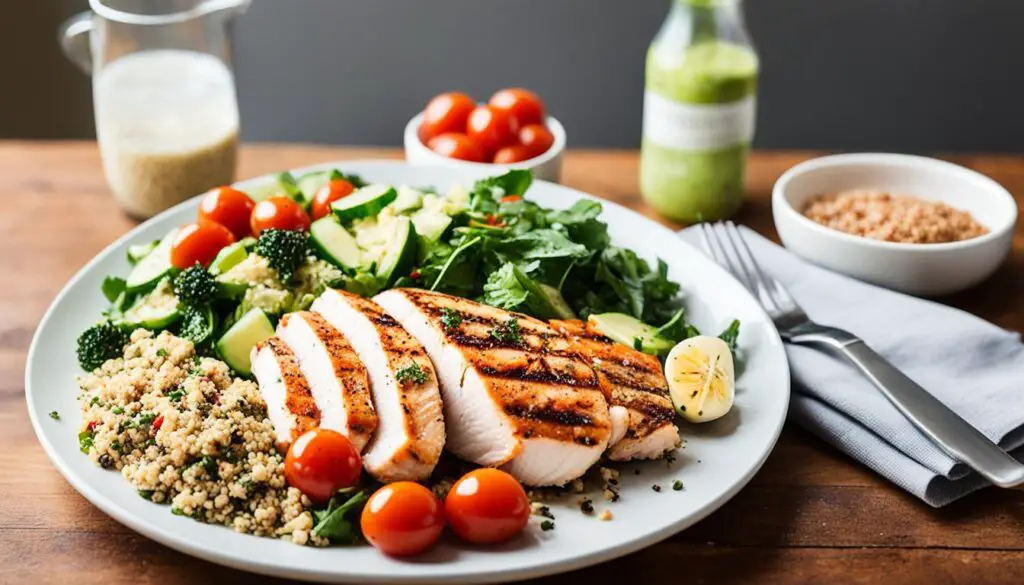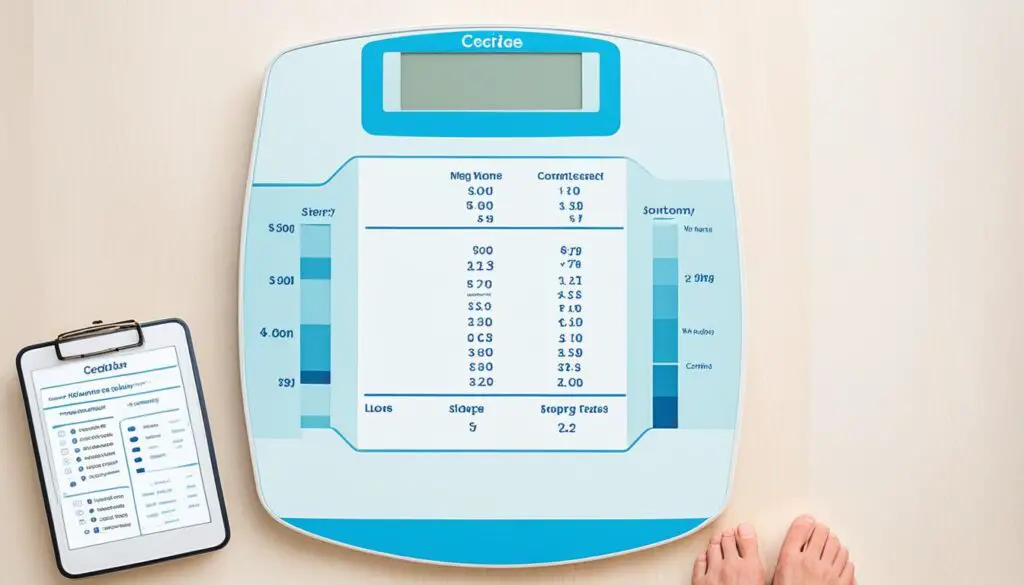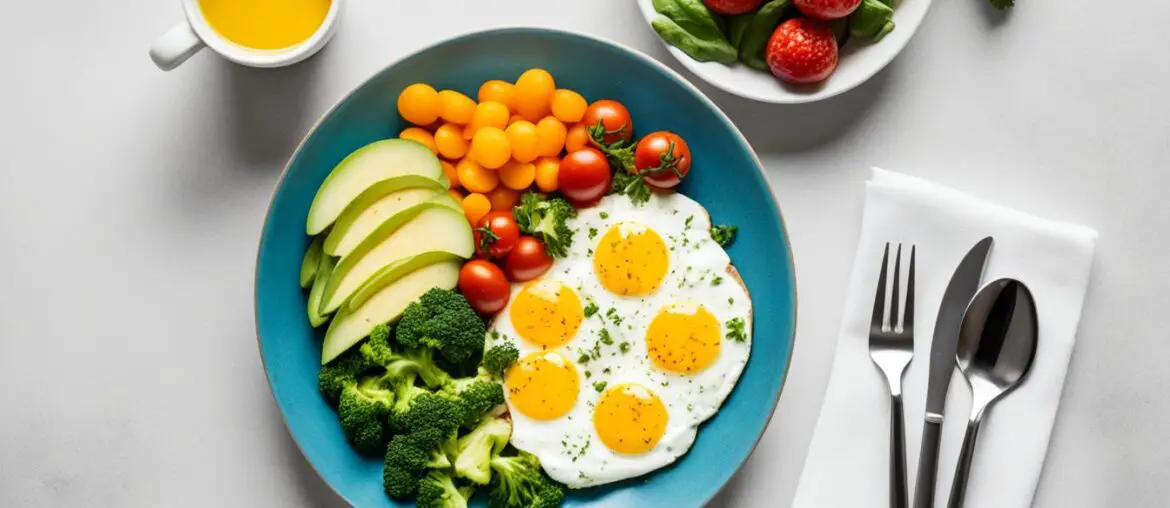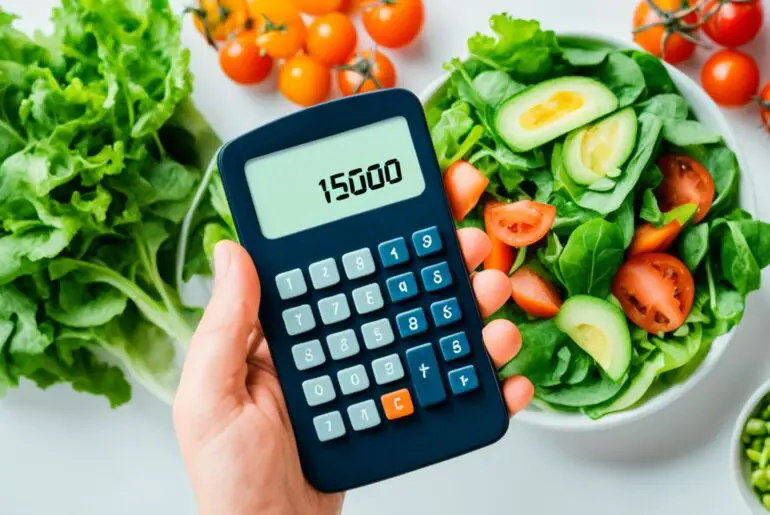Did you know that the HCG diet can help you lose an average of 1-2 pounds per day? Utterly remarkable, isn’t it? But achieving your weight loss goals is only half the battle. The real challenge lies in successfully maintaining your newly achieved weight. That’s where the HCG maintenance phase comes into play, offering a structured daily routine to ensure long-term success.
The HCG maintenance phase lasts for six weeks, with the first three weeks being carbohydrate-free. This phase focuses on gradually reintroducing carbohydrates into your diet while increasing your protein intake. Low-calorie diets are to be avoided, as they can counteract the weight maintenance progress you’ve worked so hard to achieve. To stay on track during this phase, weighing yourself daily and staying within two pounds of your last injection weight is essential.
Key Takeaways:
- Create a structured daily routine during the HCG maintenance phase to effectively maintain your weight.
- The maintenance phase lasts for six weeks, with the first three weeks being carbohydrate-free.
- Gradually reintroduce carbohydrates into your diet while increasing protein intake.
- Avoid low-calorie diets to prevent regression in weight maintenance progress.
- Weigh yourself daily and stay within two pounds of your last injection weight.
Phase 3 Guidelines
During Phase 3 of the HCG maintenance phase, it is crucial to follow the set guidelines. This phase lasts for 3 weeks and involves gradually increasing your caloric intake while focusing on protein-rich foods. Carbohydrates, including sugar, rice, bread, potatoes, and pastries, should be avoided. Vegetables such as beans and legumes can be consumed in moderation. It is recommended to weigh yourself daily to ensure you are maintaining your weight and to promptly address any weight gain.
Phase 3 of the HCG maintenance phase is an important transition period where you gradually reintroduce certain foods into your diet. The main focus during this phase is on increasing your caloric intake, particularly through protein-rich sources. By adhering to the guidelines below, you can effectively maintain your weight and continue your progress after completing the HCG diet.
1. Avoid Carbohydrates: During Phase 3, it is essential to avoid carbohydrates such as sugar, rice, bread, potatoes, and pastries. These foods can lead to weight gain and hinder your progress in maintaining your new weight. Instead, prioritize protein-rich foods and non-starchy vegetables.
2. Choose Protein-Rich Foods: Protein is a vital component of your diet during Phase 3. Include lean meats, fish, eggs, tofu, and dairy products in your meals to ensure you are consuming an adequate amount of protein. Protein not only helps with weight maintenance but also helps you feel full and satisfied.
3. Moderation with Vegetables: While non-starchy vegetables are encouraged during Phase 3, it’s important to consume them in moderation. Focus on nutrient-dense vegetables such as leafy greens, broccoli, cauliflower, and bell peppers. Include a variety of vegetables to ensure you are getting a wide range of vitamins and minerals.
4. Weigh Yourself Daily: To effectively maintain your weight during Phase 3, it is recommended to weigh yourself daily. This allows you to monitor any fluctuations and take prompt action if necessary. Aim to stay within 2 pounds of your last injection weight to ensure you are staying on track.
“By following the Phase 3 guidelines, you can successfully maintain your weight and continue to reap the benefits of the HCG diet.”
By adhering to these Phase 3 guidelines, you can ensure a successful transition from the HCG maintenance phase to long-term weight maintenance. It is essential to be mindful of your food choices and monitor your weight regularly. Remember to consult with your healthcare provider for personalized guidance and support throughout the HCG maintenance journey.
Daily Routine during HCG Maintenance Phase

Establishing a structured daily routine during the HCG maintenance phase is crucial for maintaining your weight and achieving long-term success. By following a well-planned daily schedule, you can stay on track with your HCG maintenance phase goals and develop sustainable lifestyle habits.
Start your day with a protein-rich breakfast
Kickstart your mornings with a healthy and satisfying breakfast that includes protein-rich foods. Some great options for a protein-packed start to your day are eggs, Greek yogurt, or a protein shake. Pair your protein source with berries or other low-sugar fruits to add a touch of sweetness.
Consume small, frequent meals throughout the day
Instead of sticking to three large meals, aim to eat small, frequent meals throughout the day. This approach helps keep your metabolism active and prevents overeating. Include lean meats, such as chicken or turkey, along with a variety of colorful vegetables in your meals. This combination provides essential nutrients and keeps you feeling satisfied.
Avoid high-sugar fruits and starches
While fruits are a healthy part of any diet, it’s important to choose low-sugar options during the HCG maintenance phase. Opt for berries, cherries, or grapefruit instead of high-sugar fruits like bananas or grapes. Additionally, limit your intake of starches such as bread, pasta, and potatoes to maintain stable blood sugar levels and avoid unnecessary weight fluctuations.
Incorporate exercise into your routine
Regular exercise plays a vital role in maintaining metabolism and supporting weight loss during the HCG maintenance phase. Incorporate activities that you enjoy and that fit into your schedule, such as brisk walking, cycling, or yoga. Aim for at least 150 minutes of moderate-intensity exercise per week, spread out over several days.
Weigh yourself daily and make adjustments if necessary
Monitoring your weight on a daily basis allows you to make timely adjustments to your routine if needed. Weigh yourself at the same time each day, preferably in the morning after emptying your bladder. If you notice any unwanted weight fluctuations, evaluate your daily meals, exercise routine, and hydration levels to make appropriate modifications.
Creating a daily routine that incorporates healthy eating habits, exercise, and regular monitoring of your weight is key to success during the HCG maintenance phase. By following these guidelines, you can stay on track with your goals and maintain your new weight for the long term.
HCG Maintenance Phase Meal Plan
Having a well-planned meal plan is crucial during the HCG maintenance phase as it supports your weight maintenance goals and helps you stay on track. By following a structured meal plan, you can ensure that you’re consuming the right balance of nutrients while adhering to the HCG maintenance guidelines.
Sample Menus for a Balanced Diet
Here are some sample menus for breakfast, lunch, dinner, and snacks that you can incorporate into your HCG maintenance phase:
Breakfast:
- Option 1: Spinach and mushroom omelet with a side of berries
- Option 2: Greek yogurt with sliced almonds and a sprinkle of cinnamon
Lunch:
- Option 1: Grilled chicken breast with mixed greens, cherry tomatoes, and cucumbers
- Option 2: Shrimp salad with avocado, spinach, and lemon vinaigrette
Dinner:
- Option 1: Baked salmon with steamed asparagus and quinoa
- Option 2: Grilled sirloin steak with roasted Brussels sprouts and sweet potato mash
Snacks:
- Option 1: Celery sticks with almond butter
- Option 2: Sliced bell peppers with hummus
Feel free to customize these menus based on your preferences and dietary needs. Remember to focus on lean protein sources like lean meats, fresh fish, and poultry. When choosing non-starchy vegetables, opt for nutrient-rich options like leafy greens, broccoli, and cauliflower. For fruits, go for low-sugar options like berries and citrus fruits.
When it comes to dressings and condiments, it’s best to make your own using HCG-approved ingredients. This way, you can control the quality and avoid hidden sugars or additives that may sabotage your weight maintenance efforts.
To add more variety to your HCG maintenance phase meal plan, you can explore various recipes designed specifically for this phase. There are plenty of resources online that offer HCG-friendly recipes for all meals. These recipes will help keep your meals interesting, delicious, and within the guidelines of the HCG maintenance phase.
Remember, following a well-planned meal plan during the HCG maintenance phase is an important part of successfully maintaining your weight loss. With the right balance of protein, non-starchy vegetables, and low-sugar fruits, you can continue to make healthy choices and enjoy a nutritious diet that supports your long-term weight maintenance goals.
Importance of Protein Intake

During the HCG maintenance phase, prioritizing protein intake is crucial for maintaining weight and overall health. Protein not only helps in maintaining muscle mass but also keeps you feeling full and satisfied throughout the day. Including protein-rich foods in your meals is essential to support your body’s needs during this phase.
There are various protein sources that you can incorporate into your diet. Lean meats such as chicken, turkey, and beef are excellent choices. Seafood like salmon and tuna are also rich in protein and provide essential omega-3 fatty acids. If you follow a vegetarian or vegan diet, alternatives like Greek yogurt, cottage cheese, tofu, and tempeh are great options.
When planning your meals, it is recommended to consume an adequate amount of protein during each meal. This will not only help you feel satisfied but also support your body’s metabolism and overall energy levels. Aim for a balanced combination of protein, vegetables, healthy fats, and limited carbohydrates to maintain your weight during the HCG maintenance phase.
Here is a breakdown of protein-rich foods that you can include in your HCG maintenance phase meals:
- Lean meats: Chicken breast, turkey breast, lean cuts of beef
- Seafood: Salmon, tuna, shrimp
- Dairy: Greek yogurt, cottage cheese
- Vegan options: Tofu, tempeh, edamame
Protein intake plays a key role in maintaining muscle mass, promoting satiety, and supporting weight maintenance during the HCG maintenance phase.
By prioritizing protein-rich foods, you can ensure that you are providing your body with the necessary nutrients it needs while maintaining your weight. Remember to consult with a healthcare professional or a registered dietitian for personalized guidance on your protein intake and overall dietary needs during the HCG maintenance phase.
Avoiding Carbohydrates
In the first 3 weeks of the HCG maintenance phase, it is important to eliminate all carbohydrates from your diet. Carbohydrates, including sugar, bread, rice, potatoes, and pastries, can hinder weight maintenance. Instead, focus on non-starchy vegetables and low-sugar fruits for your nutrient intake. This carb-free period allows your body to reset its metabolism and adapt to the higher calorie intake in later weeks.
During this phase, it is crucial to prioritize protein-rich foods such as lean meats, fish, poultry, eggs, and Greek yogurt. These foods provide essential nutrients and help maintain muscle mass and satiety. Remember to consult the HCG maintenance phase guidelines to ensure you are making the right choices.
Here is a list of non-starchy vegetables and low-sugar fruits that you can incorporate into your carbohydrate-free diet:
| Non-Starchy Vegetables | Low-Sugar Fruits |
|---|---|
| Broccoli | Strawberries |
| Cauliflower | Blueberries |
| Spinach | Raspberries |
| Kale | Blackberries |
| Zucchini | Watermelon |
| Mushrooms | Grapefruit |
| Asparagus | Peaches |
| Cucumbers | Apricots |
By following a carbohydrate-free diet during the first 3 weeks of the HCG maintenance phase, you allow your body to transition smoothly and adjust to the higher calorie intake in the later stages. Remember to consult the HCG maintenance phase guidelines for further guidance on maintaining a healthy and balanced diet.
Monitoring Weight and Interventions

Weighing yourself daily is an essential practice during the HCG maintenance phase. By monitoring your weight regularly, you can stay on top of any weight gain and take prompt action to address it. It’s recommended to weigh yourself first thing in the morning, after using the bathroom and before consuming food or liquids. This provides the most accurate measurement of your weight.
If you notice that your weight is more than 2 pounds above your last injection weight, it’s time to implement an intervention strategy. One effective method is to have a “steak day.” This involves skipping breakfast and lunch and having a large steak with an apple or tomato for dinner. The protein from the steak helps reset your weight, while the apple or tomato provides a natural diuretic effect to eliminate excess water weight.
Implementing a steak day once in a while can help you maintain your progress and keep your weight within range. However, it’s important to remember that this intervention should not be used as a regular practice. Instead, it should only be utilized when necessary to address temporary weight fluctuations. It’s always best to consult with a healthcare professional or a qualified HCG diet practitioner before implementing any intervention strategies.
Remember, the goal of the HCG maintenance phase is to establish a healthy routine and maintain your weight loss. Regular weight monitoring and timely interventions can help you stay on track and achieve long-term success.
Incorporating Exercise

During the HCG maintenance phase, it is important to prioritize physical activity and include exercise in your daily routine. Engaging in regular exercise not only helps maintain your metabolism but also supports long-term weight maintenance. Finding activities that you enjoy will make it easier to stay motivated and stick to your fitness routine.
There are various forms of exercise that you can incorporate into your HCG maintenance phase fitness routine. Consider activities such as:
- Walking or jogging: These low-impact exercises are great options for beginners or those who prefer a more relaxed pace.
- Swimming: An excellent full-body workout that is gentle on the joints and provides cardiovascular benefits.
- Strength training: Incorporating resistance exercises like weightlifting or bodyweight workouts helps build and maintain muscle mass, which can aid in weight management.
Listen to your body and adjust the intensity of your workouts as needed. Remember that the goal is to stay active and incorporate movement into your daily routine rather than pushing yourself to the limits. Consistency is key when it comes to reaping the benefits of exercise during the HCG maintenance phase.
Benefits of Exercise during HCG Maintenance Phase
Regular physical activity during the HCG maintenance phase offers a range of benefits beyond weight maintenance. Here are some key advantages of incorporating exercise into your daily routine:
- Improved metabolism: Exercise helps boost your metabolism, allowing your body to efficiently burn calories and maintain a healthy weight.
- Increased strength and muscle tone: Strength training exercises promote muscle development, which not only enhances physical appearance but also improves overall strength and mobility.
- Enhanced mood and mental well-being: Exercise releases endorphins, which are known as “feel-good” hormones, helping reduce stress and improve overall mental well-being.
- Better cardiovascular health: Engaging in aerobic exercises such as walking, jogging, or swimming helps improve heart health and circulation.
- Increased energy levels: Regular physical activity can help boost energy levels and combat fatigue, allowing you to stay active and productive throughout the day.
Remember to consult with your healthcare provider before starting any new exercise program, especially if you have any underlying health conditions.
| Exercise | Duration | Intensity |
|---|---|---|
| Walking | 30 minutes to 1 hour | Moderate |
| Jogging | 20 minutes to 45 minutes | Moderate to high |
| Swimming | 30 minutes to 1 hour | Moderate |
| Strength training | 2 to 3 times per week, 20-30 minutes | Moderate to high |
Staying Hydrated

During the HCG maintenance phase, it is crucial to prioritize hydration. Adequate water intake is essential for supporting digestion, metabolism, and overall health. Hydration plays a vital role in curbing hunger, flushing out toxins, and maintaining optimal body functions. Aim to drink at least 8 glasses of water per day to meet your body’s hydration needs.
Water should be your beverage of choice during the maintenance phase. It is calorie-free and helps keep you feeling refreshed and satisfied. Avoid sugary drinks and alcohol, as they can contribute to weight gain and hinder your progress.
| Benefits of Staying Hydrated during HCG Maintenance Phase | Why Water is Essential for Weight Maintenance |
|---|---|
| Supports digestion | Aids in metabolism |
| Curbs hunger | Flushes out toxins |
| Maintains optimal body functions | Improves overall health |
Make it a habit to carry a water bottle with you throughout the day to ensure you have easy access to hydration. If you find plain water boring, you can infuse it with fresh fruits or herbs for a refreshing twist. Experiment with flavors like lemon, cucumber, or mint to enhance the taste without adding extra calories.
Remember, staying hydrated is not only important during the HCG maintenance phase but also plays a significant role in overall well-being. By making water your hydration choice and prioritizing regular intake, you can support your weight maintenance goals and enjoy the benefits of optimal hydration.
Conclusion
The HCG maintenance phase is a crucial part of the overall HCG diet journey. It provides a structured approach to effectively maintain your weight after the HCG diet. By following the guidelines and adopting a disciplined daily routine, you can achieve long-term success in weight maintenance.
During this phase, it is important to focus on protein intake and avoid carbohydrates. Protein-rich foods help maintain muscle mass, keep you feeling full, and support weight maintenance. By eliminating carbohydrates, you allow your body to reset its metabolism and efficiently adapt to the higher calorie intake in later weeks.
In addition to proper nutrition, monitoring your weight, incorporating exercise, and staying hydrated play vital roles in maintaining your new weight. Monitoring your weight daily allows you to address any fluctuations promptly. Incorporating exercise into your routine helps maintain metabolism and supports weight maintenance. Staying hydrated by drinking sufficient water supports digestion, metabolism, and overall health.
By following these strategies during the HCG maintenance phase, you can maximize your post-HCG diet success and effectively maintain your new weight. Remember to stay committed to your daily routine, prioritize your protein intake, and adhere to the guidelines. Your dedication will pay off as you achieve lasting results and embrace a healthier lifestyle.
FAQ
What is the daily routine during the HCG maintenance phase?
The daily routine during the HCG maintenance phase involves following a structured plan, which includes weighing yourself daily, consuming protein-rich meals, avoiding high-carbohydrate foods, incorporating exercise, and staying hydrated.
What are the guidelines for Phase 3 of the HCG maintenance phase?
Phase 3 of the HCG maintenance phase lasts for 3 weeks and involves gradually increasing caloric intake while focusing on protein-rich foods. Carbohydrates should be avoided, except for non-starchy vegetables and low-sugar fruits.
How should I plan my daily routine during the HCG maintenance phase?
Start your day with a protein-rich breakfast, consume small, frequent meals throughout the day, incorporate exercise, and weigh yourself daily to monitor your progress.
Do you have any sample meal plans for the HCG maintenance phase?
Yes, there are various sample menus and recipes available for the HCG maintenance phase, which include protein sources, non-starchy vegetables, and low-sugar fruits.
Why is protein intake important during the HCG maintenance phase?
Protein helps maintain muscle mass, keeps you feeling full, and supports weight maintenance. Including lean meats, fish, poultry, and vegetarian protein options in your meals is recommended.
Can I consume carbohydrates during the HCG maintenance phase?
In the first 3 weeks of the maintenance phase, carbohydrates, including sugar, bread, rice, and potatoes, should be avoided. Non-starchy vegetables and low-sugar fruits can be consumed in moderation.
How often should I weigh myself during the HCG maintenance phase?
Weighing yourself daily is recommended to monitor your weight and make adjustments to your routine if necessary. Staying within 2 pounds of your last injection weight is the goal.
Is exercise allowed during the HCG maintenance phase?
Yes, exercise is permitted and encouraged during the HCG maintenance phase. Choose activities you enjoy and adjust the intensity as needed to maintain metabolism and support weight maintenance.
Why is staying hydrated important during the HCG maintenance phase?
Staying hydrated with at least 8 glasses of water per day helps support digestion, metabolism, and overall health. It can also help curb hunger, flush out toxins, and maintain optimal body functions.
What is the importance of the HCG maintenance phase in maintaining weight after the HCG diet?
The HCG maintenance phase is crucial for maintaining the weight loss achieved during the HCG diet. Following a structured routine, monitoring weight, and implementing interventions, if necessary, can help sustain your progress.




